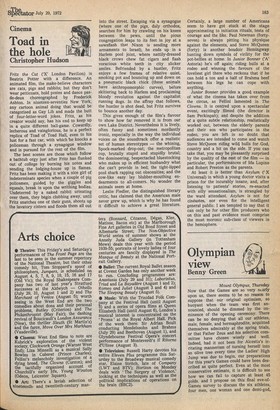Cinema
Toad in the hole
Christopher Hudson
Fritz the Cat ('X' London Pavilion) is Beatrix Potter with a difference. An animated film, the make-believe characters are cats, pigs and rabbits; but they don't wear petticoats, hold posies and dance pasde-deux choreographed by Frederick Ashton. In nineteen-seventies New York, any cartoon animal doing that would be categorised as Gay Lib and made the butt of four-letter-word jokes. Fritz, as his creator would say, has his end to keep up in a quite different ball-game. Cowardly, lecherous and vainglorious, he is a perfect replica of Toad of Toad Hall, even to his lust for a fast car, with which he knocks a policeman through a synagogue window and is pursued for the rest of the film.
The best scenes are those which follow a bathtub orgy just after Fritz has flunked out of college by burning his notes and sending the lodging-house up in flames. Fritz has been making it with a nice girl of indeterminate species when a couple of pig policemen, guided by the giggles and squeals, break in upon the writhing bodies. Undeterred by a naked rabbit urinating over them, they begin clubbing away, until Fritz snatches one of their guns, shoots up the lavatory cistern and floods them all out into the street. Escaping via a synagogue (where one of the pigs, duly orthodox, searches for him by crawling on his knees between the pews, until the pious congregation leaps to its feet in joy at a newsflash thAt Nixon is sending more armaments to Israel), he ends up in a Harlem pool joint, where nattily-dressed black crows chew fat cigars and flash voracious white teeth in city slicker smiles. Befriended by a hustler, Fritz enjoys a few frames of relative quiet, smoking pot and bouncing up and down on a pneumatic black chick (these animals have 'anthropomorphic curves), before skittering back to Harlem and proclaiming bloody revolution against the capitalist running dogs. In the affray that follows, the hustler is shot dead, but Fritz survives to bounce another day.
This gives enough of the film's flavour to show how far removed it is from our own Lake District. Nevertheless it is lively, often funny and sometimes mordantly ironic, especially in the way the individual voices on the soundtrack offer a realistic set of human stereotypes — the whining, Spock-marked drop-out; the metropolitan cop, brutally stupid and stupidly brutal; the domineering, bespectacled bluestocking who makes up in efficient husbandry what doe can't provide in bed; the tight-lipped pool shark rapping out obscenities; and the cow-like easy lay blubber-mouthing endearments to all-corners. No wonder the animals seem at home.
Leslie Fiedler, the distinguished literary critic, has claimed that the American male never grew up, which is why he has found it difficult to achieve a great literature. Certainly, a large number of Americans seem to have got stuck at the stage approximating to initiation rituals, tests of courage and the like. Paul Newman (fortyseven) is always pitting his physique against the elements, and Steve McQueen (forty) is another boudoir Hemingway hunting down symbols of virility for the pot-bellies at home. In Junior Bonner ('A' Astoria) he's off again; riding bulls at a rodeo and winning the favours of the loveliest girl there who reckons that if he can hold a ton and a half of Brahma beef between his legs he can cope with anything.
Junior Bonner provides a good example of what the cinema has taken over from the circus, as Fellini lamented in The Clowns. It is centred upon a spectacular event, excitingly filmed (the director is Sam Peckinpah); and despite the addition of a quite subtle relationship, realistically worked out, between the elderly parents and their son who participates in the rodeo, you are left in no doubt that audiences are intended to come and watch Steve McQueen riding wild bulls for God, country and a bit on the side. If you can take that, you may be pleasantly surprised by the quality of the rest of the film — in particular, the performances of Ida Lupino and Robert Preston as the parents.
At least it is better than Asylum (' X Universal) in which a young doctor visits a prison for the incurably insane, and, after listening to patients' stories, re-enacted with silly sensationalism, is strangled by the ward attendant. Asylum is not for cineastes, nor even for the intelligent general public. I am tempted to say that it can only be for other film producers who on this and past evidence must comprise the most moronic sub-class of viewers in the hemisphere.








































 Previous page
Previous page